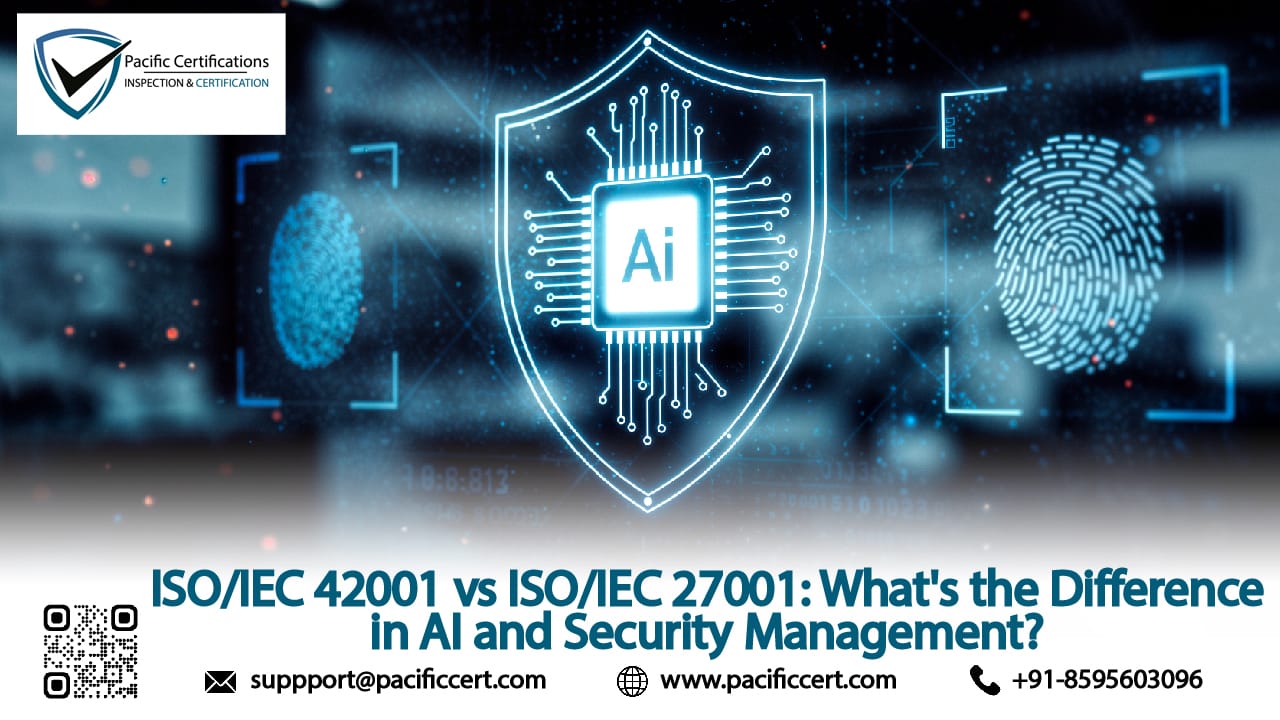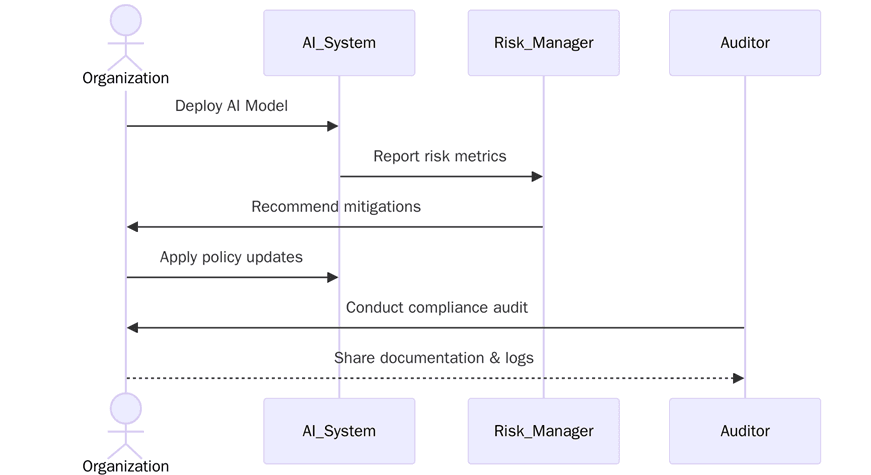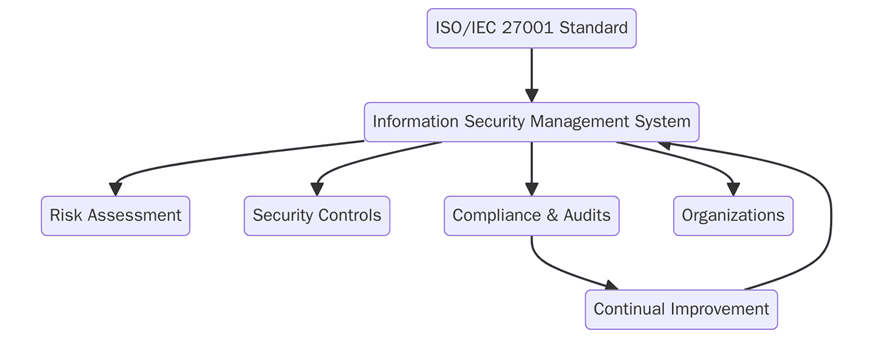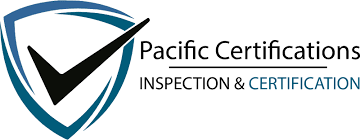ISO/IEC 42001 vs ISO/IEC 27001: Difference between AI and Security Management

Quick Summary
This article clearly distinguishes between ISO/IEC 42001 for AI governance and ISO/IEC 27001 for traditional information security management. ISO/IEC 42001 provides a framework to ensure AI systems are ethical, transparent, and responsibly governed—addressing bias, explainability, and accountability. In contrast, ISO/IEC 27001 focuses broadly on protecting data, IT infrastructure, and information assets across an organization. The guide outlines which standard suits your needs—or how combining both delivers a more comprehensive governance and security approach. Finally, it presents a step-by-step implementation roadmap to conduct gap assessments, develop plans, train personnel, perform internal audits, and pursue certification for either or both standards.
Introduction
As AI becomes ingrained into the organization's operations, there has certainly arisen a corresponding need for ensuring the security and compliance of AI. Two important standards that comprehend security and management of AI systems are ISO/IEC 42001 and ISO/IEC 27001. While the two standards focus on security and management, they attend to technology and data security from different perspectives. Understanding what really differentiates these two standards is important for any organization seeking secure management of AI and other technologies.
This blog will look into ISO/IEC 42001 for AI governance and security management of AI systems, alongside ISO/IEC 27001 as the most popular code guiding information security management systems (ISMS). We will also look at how these standards relate to AI and security management and which one may suit your needs better.
In the present digital scenario, AI technologies are implemented in all spheres-from medical to financial-reshaping the way a business functions. Being implemented precipitates threats and doubts on security, data, privacy, and ethics. On the other hand, ISO/IEC 42001 is exclusively concerned with AI governance and risks in AI systems to make sure the systems are developed and deployed responsibly, ethically, and securely. ISO/IEC 27001, on the contrary, deals with an overarching information security management system: security of data, security of IT infrastructure, and security of anything in the technology domain.
For assistance, contact us at [email protected].
What is ISO/IEC 42001?
ISO/IEC 42001 is a standard that specifically deals with the governance of AI systems and their risks, which helps organizations plan for the use of AI technologies by providing a framework for system use to ensure ethical use of AI as well as following applicable regulations and industry requirements. ISO/IEC 42001 includes:
Processes to identify, analyse, and appropriately mitigate risks associated with the deployment and use of AI systems, this includes not only data privacy and security but also ethical implications.
Transparency in AI systems, explainability of AI systems decisions, and accountability for the decisions.
Identify, address, and monitor the ethical use of AI including issues such as bias, fairness, and discrimination in AI models and algorithms.
Compliance with laws and regulations including protection from national and international laws and regulations and AI-specific regulations and requirements (legislation and regulation compliance).
What is ISO/IEC 27001?
ISO/IEC 27001 is one of the most recognized and prominent standards for information security management systems (ISMS). It provides an organization with a framework to manage and secure sensitive information and helps ensure that data within the organization is secured, managed with integrity and is only accessible when it is intended to be used. Some fundamental aspects of ISO/IEC 27001 include:
Identifying risks associated with information security and the ability to assess these risks, and to implement controls to manage these risks effectively.
Implementing security controls that ensure a person’s data (especially personal and sensitive information) is not subjected to unauthorized access, breaches or misuse.
Implementing controls to ensure that only authorized persons can access sensitive information and systems.
Ensuring that the organization is compliant with any relevant Information Security statutory and regulatory schemes including, for example, GDPR, and any industry regulatory regimes that provide a level of specific security to the organization.
For assistance, contact us at [email protected].
Key differences between ISO/IEC 42001 and ISO/IEC 27001 in AI and security management
Aspect | ISO/IEC 42001 | ISO/IEC 27001 |
|---|---|---|
Focus | AI governance and the management of AI-specific risks. | General information security management, covering all aspects of data and IT security. |
Scope | Primarily addresses the deployment, ethical use, and risks of AI systems. | Covers the security of all information, including personal, financial, and organizational data. |
AI and Data Governance | Focuses on AI-specific governance issues such as transparency, accountability, and ethics in AI systems. | Focuses on information security, including data protection, access control, and maintaining confidentiality. |
Ethical Considerations | Promotes the ethical use of AI, addressing fairness, bias, and transparency. | Does not specifically address AI ethics but focuses on overall information security. |
Risk Management | Addresses AI-specific risks such as algorithmic bias, decision-making transparency, and privacy concerns related to AI systems. | Focuses on risk management for information and IT security, including data breaches, unauthorized access, and system vulnerabilities. |
Regulatory Compliance | Ensures compliance with AI regulations and ethical guidelines in the development and deployment of AI systems. | Ensures compliance with information security regulations like GDPR, HIPAA, and industry-specific standards. |
Target Audience | Organizations using AI technologies that require a structured governance framework. | Any organization that needs to manage and protect sensitive information across their IT systems. |
Which standard should you choose?
Both ISO/IEC 42001 and ISO/IEC 27001 have important roles in security management, but they serve different aims:
ISO/IEC 42001 will be relevant for organizations focused on AI governance. If your organization is developing, deploying, or relying on AI technologies, ISO/IEC 42001 ensures that your AI systems are ethical, transparent, and comply with the regulations that are relevant. Conversely, ISO/IEC 27001 is applicable for any organization that needs to protect its information assets. It provides a generic framework for safeguarding sensitive information-and IT systems. So, if your primary concern happens to be data and IT infrastructure protection, go for ISO/IEC 27001.
How to implement ISO/IEC 42001 and ISO/IEC 27001?
1. Evaluate Existing Systems and SPOT GAPS
Begin by evaluating your existing AI Governance and Information Security systems. It will be important to discover any gaps in your compliance, risk management, and security practices to understand where to develop improvements.
2. Create an Implementation Plan
Develop a plan that details the objectives, timeline, roles, and responsibilities for the implementation of ISO/IEC 42001 and ISO/IEC 27001. Specific constraints of the overall implementation should be stated clearly, and deadlines and milestones may be specified for each part of the process. For instance:
3. Implement the Frameworks and Process
ISO/IEC 42001 bring a structure of governance regarding AI (transparency, accountability, ethical use). ISO/IEC 27001 establish an Information Security Management System (ISMS) that addresses such things as risk assessments, access controls, and data protection.
4. Education on the Standards
Ensure that all staff training on standards and processes is undertaken (especially in the areas of ethics in AI, governance, information security best practices).
5. Undertake Internal Audits
Carry out internal audits of both your AI Governance and ISMS systems regularly to check for compliance, effectiveness and identify improvements.
6. Apply for certification
Upon completing the form of implementation, apply for certification with an accreditation body to show compliance with international standards for AI Governance and Information Security.
Contact us
Pacific Certifications can guide your organization in understanding and implementing ISO/IEC 42001 and ISO/IEC 27001 for AI and security management. Our team of experts will help you establish secure and ethically governed AI systems and ensure compliance with the latest security regulations.
For assistance, contact us at [email protected].
Visit our website at www.pacificcert.com.
Ready to get ISO certified?
Contact Pacific Certifications to begin your certification journey today!
Suggested Certifications –
Read more: Pacific Blogs
